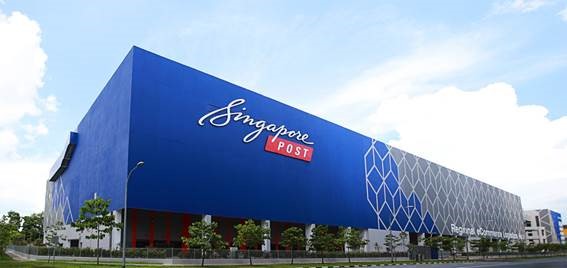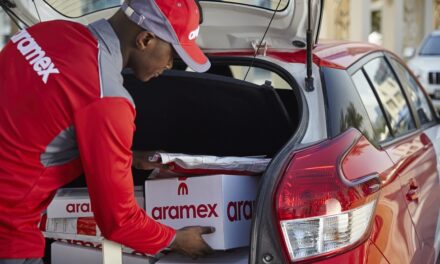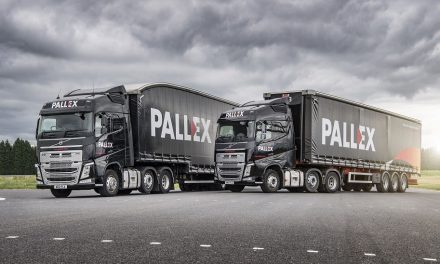
Members Only: Pallet network report
Need to deliver a load from Glasgow to Brighton without moving it all the way yourself? Membership of a pallet network may be the solution. Pallet networks are now one of the fastest growing parts of the haulage market. Yet the first company was created only ten years ago this month.
Since the first, more have followed, turning the industry from one company to a sector in its own right. And its now a very successful sector. Along the way the pallet networks have increased the efficiency of haulage, and have enabled many smaller, local companies to survive.
Palletline, Pall-Ex and Palletways are the UK’s three major pallet networks — with each operating a hub from which pallet loads are trunked in and out every night by member companies. It enables members to send a one or more pallets from one end of the country to the another without having to use dedicated trucks.
Birmingham-based Palletline was the first kid on the block, launched in February 1992 after a flash of inspiration led chairman Bob Russett, and a few others, to launch a new type of company modelled on the existing parcels networks.
“We sat around a table one night and said, ‘let’s do it’. Noone had ever applied the principle to pallets, and lots of people thought we were mad. But we have proved that it can work very successfully.”
When asked whether the pallet network industry has reached saturation point in the UK, Russett is upbeat, at least for his own company. “We are still showing a 30% year-onyear growth.
“There will come a stage — maybe at the end of a five-year period — when the volume of people in this sector means that we will start cutting each other’s throats as margins are squeezed tighter, but that is some way off. Inevitably, though, some operations will struggle and ultimately fail?’
From one of the oldest companies in the business, to one of the newest. The Pallet Network was formed in April 2000, with 27 members. Now boasting a membership of 56, the company moved in November last year from Doncaster to Rugby to be better placed and because growth levels necessitated a larger base.
MEMBERSHIP
How do you establish a grip on the market, against a host of other well-established competitors? Adam Leonards, general manager, The Pallet Network admits: “It’s not easy. The main problem is finding the right membership. People not used to being part of this kind of network sometimes find the responsibilities quite overwhelming at first. Members need to understand the importance of quality of service.
“We only exist because of our membership,” continues Leonards. “Partnership between us and our members is crucial, and a pallet network is only as strong as its weakest member.”
Leonards talks about the high standards that heavyweight competitors such as Palletline, Palletways and PallEx, inevitably set — and if this means expanding into Europe, it’s a move that the smaller guys have to follow. Hence the recent establishment of what Leonards describes as a European link which will hand The Pallet Network the potential to cover most of Europe.
He will not go into details, but admits that the pace is definitely set by the leading players. “I have a lot of admiration for them”, he adds.
And is the pallet network industry a near-saturated market? “I don’t think so yet, no”, comes the confident response.
Leonards expresses some concern regarding the shortterm nature of the market, with long-terms plans, and the ability to predict the way business will turn, a near-impossibility.
“Circumstances appear to change so quickly these days. Look at how big retail sales this Christmas have flown in the
face of fears of recession. I suppose the key is not to be overconfident.”
One company which has recently moved into Europe is Weaver Pallet Express. Its move into Europe includes investing in a dedicated team of European specialists with linguistic abilities to ensure all consignments are monitored during thier journey.
Like other networks, Weaver has enjoyed rapid growth, achieving 70% growth in sales over the past two years. Its new hub, at Fradley Park, Lichfield, is coping with over 2,500 pallets a night for final delivery to its national network of more than 70 partners.
Geodis-owned Fortec is slightly younger than Weaver, having come onto the pallet scene in 1997. John Day, whose strong industry background includes a period of eight years working for Parceline, has now been general manager for three years, and the company has tripled in size in four years — from ten members when it was launched, to a current total of 30.
LICENSEE
Member companies include Rochdale-based James Nuttall Transport, and Middiesborough-based KW Devereux.
Each potential licensee is subject to a vetting system that includes an examination of the size and type of the company (Fortec does not consider courier companies). Day describes the typical member as a “heavy-weight, larger, family run” haulage business. Four members of the Geodis group — which is the largest logistics company in France — are also Fortec licensees.
Day says he is not looking to significantly add to this figure, and feels that between 30 and 40 members would constitute the ceiling. He explains: “We are at the quality end of the market, which means restricting the number of licensees who generally attract a higher than average market rate from their customers. We don’t seek quantity but quality in the delivery service offered.”
Although Day is bullish about the future for the pallet network
The three accepted leaders of the pallet distribution market are Palletline, Pall-Ex, and Palletways. Each works in a slightly different way, and it Is difficult to work out which moves the greatest volume of pallets as there are no official figures.
Hilary Sharples of Pall-Ex says: “We are still growing at a phenomenal rate. Pallet networks have become a sector In their own right. Five years ago a pallet network was ancillary to a haulier’s business — it Is now vital to a haulier’s business. Legislation such as the Working Time Directive will impact even more on that.”
She says the Industry has moved from companies running their own fleets of vehicles to third-party distribution and now to customers who are not happy to wait even 48 hours for a delivery. “That can be done overnight by pallet companies,” she says.
Pall-Ex has 79 members. Each buys a share of Pallextra, a trust company limited by guarantee that Is owned 50% by Sharples and 50% by the members. The hub operation is owned entirely by Sharples. “We have tried to retain the independence of the business so we did not have the bureaucracy of a business run by committee and equally giving members security of tenure.
“We are continuing on our aggressive growth plan. Where can bring new members in all the time. I used to think the optimum number would be 126 post codes but it is unlikely we will get a member for every post code because some are very rural. I think the optimum is about 85 members,” she says.
The big investment in Pall-Ex In the next five years is in IT. From April it plans to use a tablet to collect signatures electronically at the point of delivery, and which will be available for customers to see on the web. In June it will unveil plans for a big expansion, Currently a European service is available through UK network members, which includes companies such as Norbert Dentressangle, but Sharples is working on building a network service across Europe.
Palletways reports it is growing quickly. In 2000 It outgrew its original 5,100sq m hub in Lichfield and moved to a 13,900sq m site at the nearby Fradley Distribution Park. This Easter it opens an extension taking it to 20,800sq m and a new building bringIng the total hub to 27,800sq m. “This will give us the opportunity to double our throughput,”
says Julian Maturi, managing director. “Whal has contributed most to our expansion is the fact that the three leading providers all demonstrate high quality service. We are all in competition with each other but the common approach to standards means we sector as a whole, he feels that newer companies face a tough time. He says: “It is extremely difficult for new networks to start up, as they cannot get the quality of licensees in outlying areas such as South Wales, Devon and Cornwall. Also, most companies are already members of a pallet network now. The real scope for new membership is for movement between the various networks.”
He adds: “But the market will continue to grow. There will be business to be gained from companies that switch from groupage haulage to the networks, and the Working Time Directive will generate more traffic for pallet networks. This will be coupled with customers demanding increasingly high levels of service?’
Most of Fortec’s work is UKbased, but Day says the company will be launching a branded tariff system in Europe later this year. Day says a European presence is “vital”, particularly as many of Fortec’s licensees have customers with pan-European operations themselves.
With a 40% volume rise in volume growth last year, Day is convinced that Fortec is in a “very strong position” to do well, he thinks the same may not be true for some of the newer kids on the block. He says: “Some of the people who have entered the market in the past few years will disappear, or merge — and I also think that parcel companies may form their own pallet networks.”
PHENOMENA
Whether there is room in the market for more pallet operators, or even for the number existing now, remains to be seen. Some other things, however, are certain. Pallet networks are a phenomena that have taken haulage by storm and regardless of whether the market can sustain all the players it does now, it’s a sector of the industry that is growing, not decreasing, in importance.
As Leonards of the The Pallet Network says: “Maybe there will be four or five key players in the market some time in the future, but for now, there’s no doubt this industry still has legs on it’.
There are now many companies in the market. These include Hellman with a 70strong network and newcomer United Pallet Network which started last June with 25 members.
are all benefiting collectively.”
Palletways has 81 members and Maturl reckons it will exceed 100 within a few years. This growth is because of the double digit growth of some members year on year, he says. The Palletways network is owned by the central orqanisation and all the hauliers have contracts with the central organisation; it Is not owned by its members. All invokes are sent out by the hub and the money allocated to the members, unlike other networks where the members bill and pay the delivering member.
“I think the next stage in the market will not be ratlonalisation but split between the co-operatives and wholly-owned. I think there are six networks that are serious and each network will end up with their own definition of best. A number of traditional hauliers felt that Joining a network was beneath them but now they are finding that collectively we do a very good job. The leading networks are driving quality and professionalism.”













